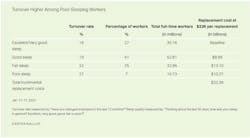Poor Sleep Linked to $44 Billion in Lost Productivity
Workers who typically get a poor night's sleep–estimated to be 7% of the US workforce–report more than double the rate of unplanned absenteeism compared with other workers, resulting in an estimated $44.6 billion in lost productivity each year.
Poor sleepers reported 2.29 days of unplanned missed workdays in the past month due to poor health, compared with 0.91 days for all other workers. These estimates are after controlling for factors that can affect both sleep and health-related absenteeism, including all major demographics, general overall health, clinical depression/anxiety, significant daily stress and COVID-19. (Report methodology summarized at the end of the article.)
Poor-Sleeping Workers More Likely to Change Jobs
Many factors influence turnover in the workplace, principal among them employee engagement, employee well-being and the critical role of the manager in influencing both. The combination of engagement, well-being and strengths usage has a demonstrated cumulative effect in reducing the chances of turnover.
Well-being is shown to have a clear link to sleep as well as to relate to depression/anxiety, another source of poor sleep. And engagement is proven to mitigate factors that trigger poor sleep, such as commute time-related stress. As such, poorly engaged workers or workers with poor well-being (or both) would also be expected to get lower-quality sleep, and the very act of changing jobs could result in poorer sleep than usual.
Poor sleepers are so routinely inadequately rested that unhealthy days resulting in missed work are more than doubled compared with all other workers, independent of other health-related issues.
Consistent with these relationships, workers who don't sleep well are more likely to report having changed jobs in the prior 12 months, either voluntarily or involuntarily. Workers who rate their typical sleep as either excellent or very good changed jobs at a rate of 16% in the prior 12 months, compared with 19% of good sleepers, 22% of fair sleepers and 27% of poor sleepers. As such, if all full-time workers changed jobs at the same rate as excellent or very good sleepers, the resulting reduction in turnover would be 980,557 jobs each year, saving US employers $32.4 billion in replacement costs. (See Figure 1.)
Implications
The importance of good/high-quality sleep to the economy is significant. With about 155 million workers (full- and part-time) in the US workforce, the 7% who report poor sleep over the prior month represents an estimated 11 million persons in the formal workforce who are executing their jobs with substandard levels of restfulness, followed by another 25% who report only fair sleep. Poor sleepers are so routinely inadequately rested that unhealthy days resulting in missed work are more than doubled compared with all other workers, independent of other health-related issues. And lack of sleep does not merely result in poor rest. Research has shown that it also impairs a person's ability to focus and learn efficiently and to consolidate memory, critical aspects of a functioning workforce.
For leaders who embrace a well-being culture in their workplace, elevating the importance of sleep within well-being-related intervention programs is likely to yield a substantial return on their investment given the percentage of employees who sleep poorly. (Check out the sidebar: What in the World is a Well-Being Culture?)
This includes education on the importance of exercise, healthy eating and stress/worry management (including not worrying about the act of falling asleep itself), as well as the importance of sticking to a bedtime routine with consistent bedtimes and waketimes, exchanging reading books for staring at screens before sleep, investing in a pillow that maximizes comfort, and using mattresses that are appropriately supportive of the spine and distributive of temperature. By treating sleep as a major mechanism for improving employee well-being, employers can simultaneously improve the lives of their workers along with business outcomes that are critical to their success.
ABOUT THE AUTHORS
Dan Witters is Research Director of the Gallup National Health and Well-Being Index, and Sangeeta Agrawal is Principal Investigator, Gallup, Inc.
This daily assessment of US residents' well-being provides near real-time measurement and insights needed to improve health, increase daily productivity, enhance basic needs, and lower healthcare costs. Dan frequently presents at major conferences and summits. His research insights appear regularly on Gallup.com and in national media, including in The New York Times, Time, The Washington Post, The Economist, USA Today, National Geographic and The Wall Street Journal.
Full study results can be found in the new Casper-Gallup The State of Sleep in America 2022 Report, which provides a comprehensive look at Americans' sleep.
For more information, visit https://www.gallup.com/. Follow them on Twitter @Gallup and @GallupNews and LinkedIn: https://www.linkedin.com/company/gallup/.
What in the World is a Well-Being Culture?
Gallup and Healthways have developed a comprehensive, definitive source of well-being measurement, the Gallup-Healthways Well-Being 5. This scientific survey instrument and reporting experience measures, tracks, and reports on the well-being of individuals and organizations.
The five essential elements of well-being are:
- Purpose: liking what you do each day and being motivated to achieve your goals
- Social: having supportive relationships and love in your life
- Financial: managing your economic life to reduce stress and increase security
- Community: liking where you live, feeling safe, and having pride in your community
- Physical: having good health and enough energy to get things done daily
About the Author
Dan Witters
Research Director of the Gallup National Health and Well-Being Index
Dan Witters is Research Director of the Gallup National Health and Well-Being Index. Dan frequently presents at major conferences and summits. His research insights appear regularly on Gallup.com and in national media, including in The New York Times, Time, The Washington Post, The Economist, USA Today, National Geographic and The Wall Street Journal.
For more information, visit https://www.gallup.com/. Follow them on Twitter @Gallup and @GallupNews and LinkedIn: https://www.linkedin.com/company/gallup/.
Sangeeta Agrawal
Principal Investigator, Gallup, Inc.
Sangeeta Agrawal is Principal Investigator, Gallup, Inc. For more information, visit https://www.gallup.com/. Follow them on Twitter @Gallup and @GallupNews and LinkedIn: https://www.linkedin.com/company/gallup/.

